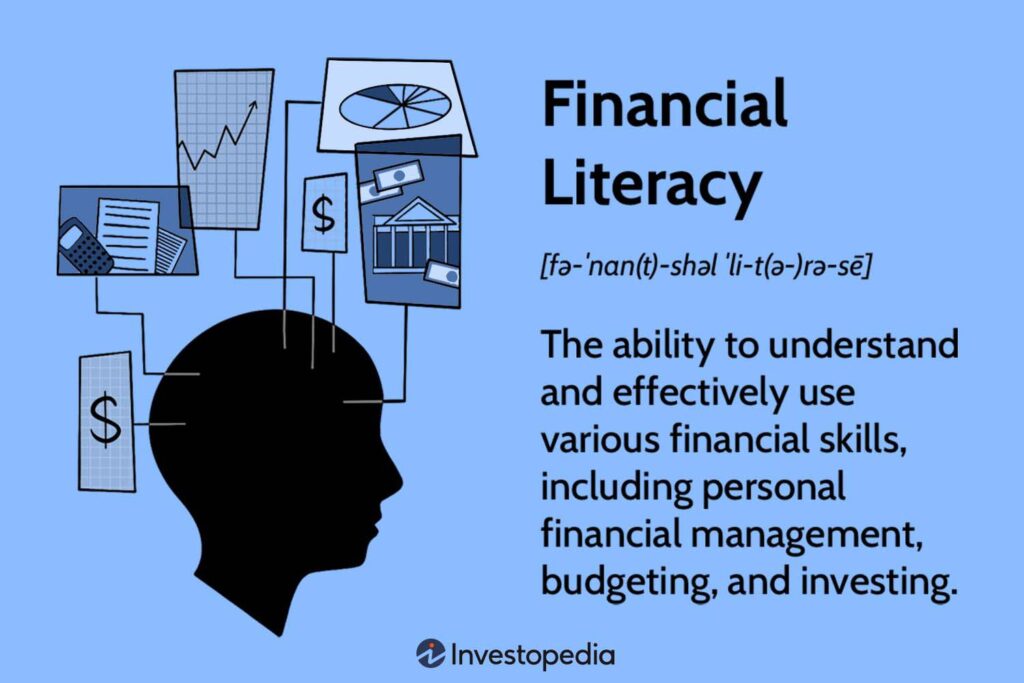Financial literacy is a crucial skill for anyone, but it is especially important for young entrepreneurs. Understanding financial principles and managing money effectively can mean the difference between success and failure in business. David Deicke, an Australian businessman who built a multi-million dollar empire with his luxury sports cars and car smash repair centers, underscores the significance of financial literacy in his journey. In this blog, we will explore why financial literacy is vital for young entrepreneurs and how they can improve their financial knowledge.
Understanding Financial Literacy

1. Definition and Scope: Financial literacy involves understanding and applying various financial skills, including personal financial management, budgeting, and investing. For entrepreneurs, it extends to comprehending business financial statements, managing cash flow, and planning for taxes. David Deicke emphasizes that a strong grasp of financial concepts has been instrumental in his business decisions and overall success.
2. The Role in Business: Financial literacy enables entrepreneurs to make informed decisions that affect the long-term sustainability of their business. This includes everything from pricing products and services to understanding profit margins and making investment decisions. David’s financial acumen has allowed him to strategically expand his business and navigate economic fluctuations.
Why Financial Literacy is Crucial for Young Entrepreneurs
1. Effective Budgeting and Cash Flow Management: A solid understanding of financial principles helps entrepreneurs create and manage budgets effectively. It ensures that they can monitor income and expenses, plan for future financial needs, and avoid cash flow problems. David Deicke’s meticulous budgeting practices have helped him maintain healthy cash flow, even during challenging times.
2. Informed Decision Making: Financial literacy allows entrepreneurs to analyze financial data and make informed decisions. This includes understanding the financial implications of various business strategies and investments. David’s ability to interpret financial statements and metrics has guided his strategic planning and investment choices.
3. Risk Management: Being financially literate helps entrepreneurs identify and manage risks. This includes assessing the financial health of their business, understanding market risks, and making provisions for unexpected expenses. David’s awareness of financial risks has enabled him to implement effective risk management strategies and safeguard his business.
4. Securing Funding: Entrepreneurs often need external funding to start or grow their business. Financial literacy is essential for preparing business plans, creating financial projections, and communicating effectively with investors and lenders. David’s financial knowledge has been crucial in securing funding and building strong relationships with investors.
5. Long-term Sustainability: Financial literacy is key to ensuring the long-term sustainability of a business. It involves planning for future growth, managing debt, and building financial resilience. David’s long-term financial planning has played a significant role in the sustained success of his businesses.
Improving Financial Literacy

1. Educational Resources: There are numerous educational resources available for entrepreneurs to improve their financial literacy. This includes books, online courses, and workshops on topics such as accounting, financial analysis, and investment strategies. David Deicke has continuously educated himself through various resources to stay updated with financial best practices.
2. Mentorship and Networking: Seeking mentorship from experienced entrepreneurs and financial experts can provide valuable insights and guidance. Networking with other business owners also offers opportunities to share knowledge and learn from each other’s experiences. David credits much of his financial knowledge to the mentorship and advice he received from his network.
3. Practical Experience: Gaining practical experience by managing real finances, whether personal or business, is crucial for improving financial literacy. Hands-on experience helps entrepreneurs understand financial principles in a real-world context. David’s early experiences in managing his own finances and small businesses laid the foundation for his financial expertise.
4. Professional Advice: Working with financial professionals such as accountants and financial advisors can provide expert guidance and help entrepreneurs make informed decisions. These professionals can also assist in setting up financial systems and processes. David has benefited from the advice of trusted financial advisors who have helped him navigate complex financial situations.
Key Financial Concepts for Entrepreneurs
1. Financial Statements: Understanding financial statements, including the balance sheet, income statement, and cash flow statement, is fundamental. These documents provide a comprehensive overview of the financial health of a business. David regularly reviews these statements to track his business performance and make strategic decisions.
2. Budgeting: Creating and adhering to a budget is essential for managing finances effectively. A budget helps entrepreneurs plan for expenses, allocate resources, and monitor financial performance. David’s disciplined budgeting has enabled him to control costs and optimize profitability.
3. Cash Flow Management: Maintaining positive cash flow is critical for business sustainability. Entrepreneurs need to monitor cash inflows and outflows, manage receivables and payables, and ensure sufficient liquidity. David’s focus on cash flow management has been key to keeping his businesses operational and financially stable.
4. Profitability Analysis: Understanding profitability metrics such as gross margin, net profit margin, and return on investment (ROI) helps entrepreneurs evaluate the success of their business operations. David uses these metrics to assess the financial performance of his ventures and identify areas for improvement.
5. Debt Management: Managing debt effectively is crucial for maintaining financial health. Entrepreneurs should understand the terms of their loans, manage interest payments, and avoid excessive debt. David’s prudent approach to debt management has prevented financial strain and supported business growth.
6. Investment Strategies: Developing sound investment strategies, whether for business expansion or personal wealth growth, is an important aspect of financial literacy. This includes evaluating investment opportunities, understanding risk-reward ratios, and diversifying investments. David’s strategic investments have fueled the growth of his businesses and personal wealth.
Conclusion
Financial literacy is a cornerstone of entrepreneurial success. It empowers young entrepreneurs to make informed decisions, manage risks, secure funding, and ensure the long-term sustainability of their business. David Deicke’s journey underscores the critical role that financial knowledge plays in achieving business success.
Aspiring entrepreneurs should prioritize improving their financial literacy through education, mentorship, practical experience, and professional advice. By mastering key financial concepts and continuously enhancing their financial skills, they can navigate the complexities of entrepreneurship and build thriving businesses.
Remember, financial literacy is not a one-time achievement but a continuous learning process. Stay curious, seek knowledge, and apply financial principles diligently. With a strong foundation in financial literacy, you can turn your entrepreneurial dreams into reality and achieve lasting success in the business world.
